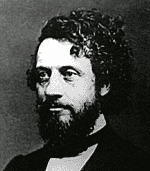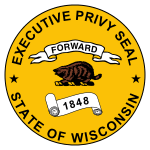Arthur MacArthur Sr.
| Arthur MacArthur Sr. | |
|---|---|
 Arthur MacArthur Sr. | |
| 4th Governor of Wisconsin | |
|
In office March 21, 1856 – March 25, 1856 | |
| Preceded by | William A. Barstow |
| Succeeded by | Coles Bashford |
| 5th Lieutenant Governor of Wisconsin | |
|
In office January 6, 1856 – January 4, 1858 | |
| Governor | Coles Bashford |
| Preceded by | James T. Lewis |
| Succeeded by | Erasmus D. Campbell |
| Judge of the United States District Court for the District of Columbia | |
|
In office July 15, 1870 – April 1, 1887 | |
| Appointed by | Ulysses S. Grant |
| Preceded by | new seat |
| Succeeded by | Martin V. Montgomery |
| Personal details | |
| Born |
January 26, 1815 Glasgow, Scotland, United Kingdom |
| Died |
August 26, 1896 (aged 81) Atlantic City, New Jersey, United States |
| Political party | Democratic |
| Spouse(s) |
Aurelia Belcher MacArthur (m. circa 1844-1864) (her death) Mary E. MacArthur (c. 1865-1896) (his death) |
| Children |
Arthur MacArthur Jr. Frank MacArthur |
| Profession | Lawyer |
| Religion | Presbyterian |
Arthur MacArthur Sr. (January 26, 1815 – August 26, 1896) was a Scottish-born lawyer, judge, and politician who served as the fourth Governor of Wisconsin for four days in 1856, in the midst of an election scandal.[1][2] His son, Arthur MacArthur Jr., was the father of General Douglas MacArthur.
Early life
MacArthur was born in Glasgow, Scotland, the descendant of Highlander nobility through his father, who had died just seven days before his birth in 1815. His mother remarried and moved the family to Uxbridge, Massachusetts in 1828. MacArthur attended school briefly at Wesleyan University in Connecticut, but dropped out to help his family through a severe economic depression in 1837.
Career
MacArthur worked as a law clerk in Boston and then New York. He was admitted to the bar in New York in 1841. With the help of his father-in-law, MacArthur established a very successful legal practice in Springfield.
Differences in politics between the immigrant Democrat MacArthur and his conservative Whig in-laws soon led him to move his family from their influence. He set up a law office in New York City in 1845, and finally settled in Milwaukee, Wisconsin in 1849. MacArthur quickly befriended the powerful in his new home state, and was elected as the city attorney of Milwaukee in 1851. In 1855, he was offered the Democratic nomination for lieutenant governor, as running mate to the incumbent, William A. Barstow.
The election ended in scandal. Though Barstow was initially declared winner by a mere 157 votes, the result was challenged as a fraud by Barstow's opponent, the Republican Coles Bashford, and it was substantiated that election returns had been forged from non-existent precincts. Barstow kept hold of the office anyway, and as the rivals' militia forces converged on the state capital of Madison threatening to start a civil war, Barstow and MacArthur were inaugurated publicly on January 7, 1856. Despite his promises to hold on to the office at all costs, Barstow eventually realized that he was fighting a losing battle both legally and in public opinion, and resigned on March 21, 1856, four days before the Wisconsin Supreme Court resolved the controversy in favor of Bashford. MacArthur became acting governor upon Barstow's resignation and initially repeated his predecessor's resolve to remain in office. On March 25, however, when confronted face to face with a threat to use force from Bashford - a county sheriff and a throng of Bashford's followers - MacArthur and his supporters vacated the Capitol. MacArthur finished his term as lieutenant governor, leaving office in 1857.[3]
The election scandal somehow left MacArthur's reputation relatively unscathed, and he won election for two terms as a judge on the Wisconsin Circuit Court, Second Judicial Circuit, from 1857 until 1869.[4] On July 15, 1870, President Grant appointed MacArthur as an associate justice on the Supreme Court of the District of Columbia. This court was renamed the U.S. District Court for the District of Columbia with the congressional Act of June 25, 1936, 49 Stat. 1921. The seat MacArthur was nominated to was created by 16 Stat. 160. He was confirmed by the United States Senate on July 15, 1870, and received his commission on July 15, 1870, holding the position until his retirement in 1887. He spent his remaining years in Washington moving in high society, accepting speaking engagements, and writing books.
Death
MacArthur died in Atlantic City, New Jersey from throat cancer and was buried in Rock Creek Cemetery in Washington.
Family life
Around 1844, MacArthur married Aurelia Belcher (1819–1864), the daughter of a wealthy industrialist. They had two sons, Frank, and famed General Arthur MacArthur Jr., born in Chicopee Falls, Massachusetts in 1845, for whom he had first secured an appointment to the United States Military Academy and then as a first lieutenant in the 24th regiment of Wisconsin Volunteers. Arthur Jr. was himself the father of a general of even greater fame, the World War II commander, Douglas MacArthur, who shared his grandfather's birthday of January 26. He also married Mary E. MacArthur (1824–1899).
References
- ↑ "McArthur, Arthur 1815 - 1896". Wisconsin Historical Society. Archived from the original on February 2, 2014.
- ↑ Perret, Geoffrey (1996). Old Soldiers Never Die: The Life of Douglas MacArthur. New York City: Random House, Inc. p. 3. ISBN 9780679428824.
- ↑ 3 governors held office within weeks, Dennis McCann. Milwaukee Journal Sentinel, December 10, 1998.
- ↑ History of the Federal Judiciary Archived May 27, 2010, at the Wayback Machine.
External links
| Wikimedia Commons has media related to Arthur MacArthur Sr.. |
- "Judge Arthur MacArthur (1817-1896)". PBS. Retrieved April 27, 2016.
- Arthur MacArthur Sr. at Find a Grave
| Political offices | ||
|---|---|---|
| Preceded by William A. Barstow |
Governor of Wisconsin 1856 |
Succeeded by Coles Bashford |
| Preceded by James T. Lewis |
Lieutenant Governor of Wisconsin 1856–1858 |
Succeeded by Erasmus D. Campbell |
| Legal offices | ||
| Preceded by new seat |
Judge of the United States District Court for the District of Columbia 1870–1887 |
Succeeded by Martin V. Montgomery |

